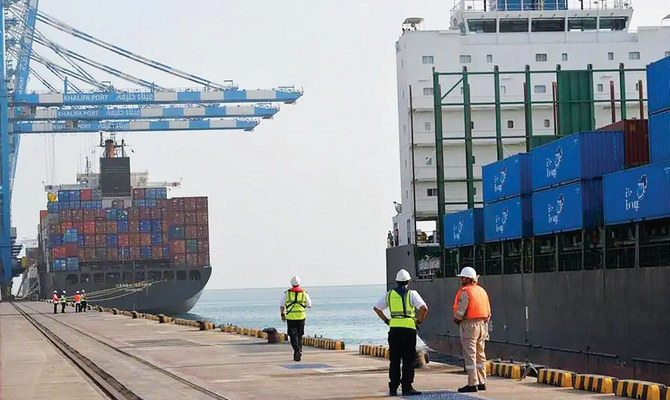CAIRO: Digital logistics platform Transportr has successfully concluded its eight-figure seed funding round with the participation of Ittihad Ventures Holding and Industrial Capital Group.
Established in 2020, the UAE-based company acts as a multimodal digital freight marketplace, connecting shippers and carriers across various industries to facilitate efficient, transparent, and cost-effective movement of goods.
The platform addresses concerns such as freight rates, manual processes, enhanced visibility, traceability and customer service.
The proceeds from the funding round will be instrumental in driving the company’s growth within the UAE market and facilitating its expansion into Saudi Arabia, a key strategic move to tap into the thriving logistics sector in the region.
Transportr is also building toward its next series A funding round.
“Transportr has evolved to managing all freight modes (road, sea, rail and air) in addition to warehousing, material handling, logistics education and more,” said Hassan Khazem, CEO of Transportr.
He added: “Our vision is to provide any company with a one-stop shop digital solution to manage all its supply chain activities while having environmental, social, and governance factors in mind. We aim to unleash the power of aggregation and bring value to our partners such as significant cost savings, access to data analytics and artificial intelligence.”
Transportr’s notable capability lies in its ability to compare rates offered by various carriers, empowering shippers to make well-informed decisions about their shipping choices.
HashMove raises pre-series A to relocate to Saudi Arabia
UAE-based logistics platform HashMove has successfully raised an undisclosed amount in a pre-series A funding round led by
Bahrain’s Bunat Ventures in collaboration with a prominent Saudi business group.
HashMove, established in 2017 by Noman Mohammad, Rayan Al Bakri, and Sarfaraz Alam, provides solutions for various logistics needs, including instant rate sourcing for the initial leg of transportation, efficient booking capabilities, and end-to-end cargo movements and tracking.
The raised funds will play a crucial role in HashMove’s expansion plans, as well as the relocation of its headquarters to Saudi Arabia. The strategic move aims to capitalize on the Kingdom’s thriving logistics industry and position HashMove at the forefront of the market.
By establishing a strong presence in Saudi Arabia, HashMove can enhance its service offerings and strengthen its network in the region.
HashMove’s expansion and relocation to Saudi Arabia align with the company’s long-term vision of becoming a key player in the Middle East logistics market.
The company has already signed deals with Saudi companies including United Warehousing Co., a third-party logistics powerhouse based in Jeddah.
The new funding will enable HashMove to enhance its capabilities, scale its operations, and provide even greater value to its customers. HashMove has already attracted over 900 logistics providers across 90 countries and aims to revolutionize the global logistics landscape.
UzOman invests in Switzerland’s Zood
UzOman, a collaborative investment fund established by the Omani and Uzbek sovereign wealth funds, has recently made an undisclosed investment in Swiss fintech company Zood.
Founded in 2018 by Michael Khoi, Zood operates as a comprehensive digital lending platform, offering a complete ecosystem comprising ZoodPay for financial technology, ZoodMall for e-commerce, and ZoodShip for logistics solutions.
The investment from UzOman is strategically aimed at driving digital lending innovation in Uzbekistan.
By injecting funds into Zood, the joint investment fund intends to foster the growth and development of the fintech sector in the country. This infusion of capital will support Zood in expanding its operations and further enhancing its digital lending services in Uzbekistan.
“This investment is part of our ongoing efforts to promote and invest in Uzbekistan’s rapidly growing financial sector. Zood’s focus on providing innovative, convenient, and secure payment solutions align well with UzOman’s plans to invest in the financial sector in Uzbekistan and empower businesses and individuals with cutting-edge financial tools,” Mohamed Al-Lawati, CEO of UzOman, said.
The collaboration between UzOman and Zood signifies a mutual commitment to leveraging technology and finance to advance the economic landscape of Uzbekistan.
“UzOman’s investment is a testament to Zood’s pioneering role in driving financial inclusion through a holistic ecosystem that provides comprehensive solutions for individuals and businesses in Central Asia and the Middle East. We are proud to collaborate with UzOman to further expand our reach and impact, creating economic opportunities in Uzbekistan,” Khoi said.
VMS acquires stakes in Cash Cows
The startup ecosystem in the Middle East and North Africa is poised to get a boost as Saudi Arabia-based venture studio VMS has acquired minority stakes in Egyptian start-up accelerator Cash Cows. The purchase of stakes is part of a strategic partnership agreement aimed at supporting the entrepreneurial ecosystem in both countries and in the wider MENA region, according to a press release. The press release further noted that the partnership will see Cash Cows and VMS launching a joint platform for exchanging ideas, collaboration, and mutual learning between them.
The platform will also provide ways for startups, investors, and entrepreneurs to access critical decisions that ensure their success, it added.
Motaz Saleh Abuonoq, founder and CEO of VMS said that the company’s expansion in the Egyptian market was an important and strategic goal.
VMS supports talented startups entering the Saudi market and provides them with guidance, resources, expertise, and connections.
Mohamed Nagaty, partner at Cash Cows, said the partnership with VMS will contribute to building a bridge between Egypt and Saudi Arabia for startups, along with expanding the scope of operations for both companies.
The coming together of two regional accelerators is aimed at providing resources and support for startups and drawing a clear map for investors to achieve excellence in the highly competitive market, the release added.




























